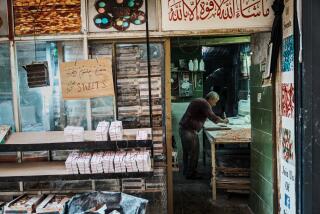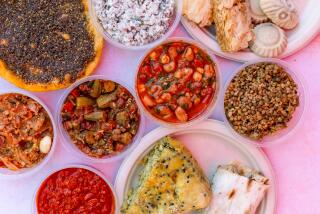Syria’s other war: The battle to save its economy
DAMASCUS, Syria — They begin lining up early here for the comforting illusion of stability in uncertain times.
“Dollars provide some security,” explained Abu Mohammed, a young man in jeans and a T-shirt who was one of scores enduring long waits to exchange Syrian pounds for U.S. currency.
The demand for scarce greenbacks at exchanges in the Syrian capital is just one symptom of the economic woes facing Syria, which long was regarded as one of the Middle East’s most livable places.
With low costs, abundant resources and subsidized healthcare, Syria was widely regarded as an economic haven, even for those with modest incomes. It boasted a thriving middle class and a solid industrial and agricultural base.
That’s all in the past. Two years of conflict have left thousands of factories destroyed or looted, vast swaths of the country under the control of fragmented opposition forces or brigands, and ravaged towns and fields.
A Western embargo has blocked sales of oil, a major export. At any rate, rebels have overrun oil fields in the east and north.
The allure of Roman ruins, Crusader castles, Ottoman souks and sandy Mediterranean beaches once drew a huge tourist trade, primarily from Europe and the Middle East, providing a crucial source of foreign currency. Today, Syria’s iconic images inevitably involve armed men threading their way through piles of rubble that were once vibrant industrial and residential zones. Tourism has collapsed.
Though much of the news out of Syria focuses on the civil war between the government and rebels trying to oust President Bashar Assad, the nation is also fighting a battle to remain afloat economically. Assad’s government has received deep financial support from Iran and Russia, which are also supporting him militarily.
Neither country appears inclined to abandon Assad. Barring a major battlefield reversal at a time when the government seems to have the momentum, that support probably is enough to ensure that Assad can endure. But the economy represents another front on which Syrian officials must focus attention.
The Syrian pound traded at about 47 to the dollar when the conflict broke out in March 2011. Its value eroded gradually, but a free fall began last month, when speculation drove the exchange rate to more 300 to the dollar.
The government pumped millions of dollars into the system from its dwindling cash reserves in a bid the stabilize the pound, with some success. But the rate has lingered at about 200 to the dollar on the unofficial market; legal exchange houses here sell for less, about 175 to the dollar.
Alarmed, the government on Sunday issued a decree banning the use of foreign currencies for commercial purposes. Violators face stiff fines and jail terms.
The move is meant to “prevent the dollarization of the economy” and “prosecute manipulators,” Adib Mayala, governor of the Central Bank of Syria, told the state-run news service.
On the streets of the capital, talk of rapidly rising prices often eclipses chatter about news bulletins from the front lines. The inflation rate was estimated at 50% last year, but residents say prices have doubled and in some cases tripled in the last year, especially in recent months. The price increases are felt acutely now, during the shopping spree that traditionally accompanies the end of the Islamic holy month of Ramadan and preparations for the Eid al-Fitr holiday.
“The situation is really terrible,” said a mother of four interviewed in the storied Hamidiyah shopping arcade in Damascus’ Old City, where Roman colonnades vie with Ottoman-era arches in a stunning tableau. “For a set of clothes for my kids, I pay twice as much as I did last year.”
The city did take on a festive air as many broke their daylong fasts in the final week of Ramadan. Resilient Damascenes flocked to the stalls of the Old City and to shopping areas such as Old Bridge Street and Hamra Street. The war has mostly spared the capital, affording an air of normality — except for the occasional rebel mortar strike or car bomb, and the ubiquitous military checkpoints.
People have managed to enjoy some modest luxuries. Fragrance shops selling homemade perfumes were enjoying a brisk trade. And business was booming at one of the Old City’s signature establishments, the Bakdash ice cream parlor, where cream is churned by hand and pounded before pistachio and other delights are added.
“Here, it’s business as usual,” said Abu Mazen, shearing off scoops from frozen vats and smearing the delicacy on cones as he has for 20 years.
Many shop owners expressed sympathy for their hard-pressed customers, even as they try to cope with higher prices and reduced sales.
“We’re selling essentials like rice and pasta at cost,” said Muayad Baka, who owns a well-stocked grocery and spice store in the bustling Bab al Jabiyah souk in the Old City. “Some people have lost their morals and try to make extra profit. This is very troubling. I worry about what is happening to us Syrians.”
As he spoke, a woman broke in with her own tale of woe. Her 6-year-old son had been diagnosed with Hodgkin’s disease, and she had to transport the boy daily on a perilous trek from her flat in the Old City to a clinic in Harasta, a Damascus suburb that is a battleground for government troops and rebels.
“We are all suffering from higher prices, but it’s not the worst thing,” said the woman, dressed in a full black robe and sunglasses. “What about all those who have lost loved ones and their homes?”
Next door, business seemed steady at a used clothing shop stocked with shirts, slacks and jackets, mostly of the polyester persuasion, shipped in containers from North America via Lebanon.
“To be honest, we are giving stuff away now,” said the proprietor, Abu Mahmoud, a thin, jovial man with a baritone voice who was decked out in a track suit and sneakers and taking drags from his cigarette.
Outside the majestic Umayyad Mosque, formerly the site of a Roman-era Temple of Jupiter and the basilica of St. John the Baptist, a group of young volunteers organized a communal kitchen to feed thousands each evening during Ramadan. Cooks prepared huge pots of rice and chicken to be distributed at area mosques.
“So many people are hungry,” said Angela Battah, 20, a university student pursuing tourism studies. “This has nothing to do with politics. We are all Syrians.”
At the exchange house, time was running out for Abu Mohammed, who said he had been waiting eight hours to exchange his Syrian pounds for $350, the legal limit.
The hotel clerk said he and co-workers hadn’t been paid in six months, a not-uncommon complaint here. “The owner told us, ‘If you don’t like it, find another job,’” said Abu Mohammed, who is 25 and single and studies law on the side.
He and his colleagues survive on tips, he said. “If we’re lucky, they tip us in dollars.”
More to Read
Start your day right
Sign up for Essential California for news, features and recommendations from the L.A. Times and beyond in your inbox six days a week.
You may occasionally receive promotional content from the Los Angeles Times.






